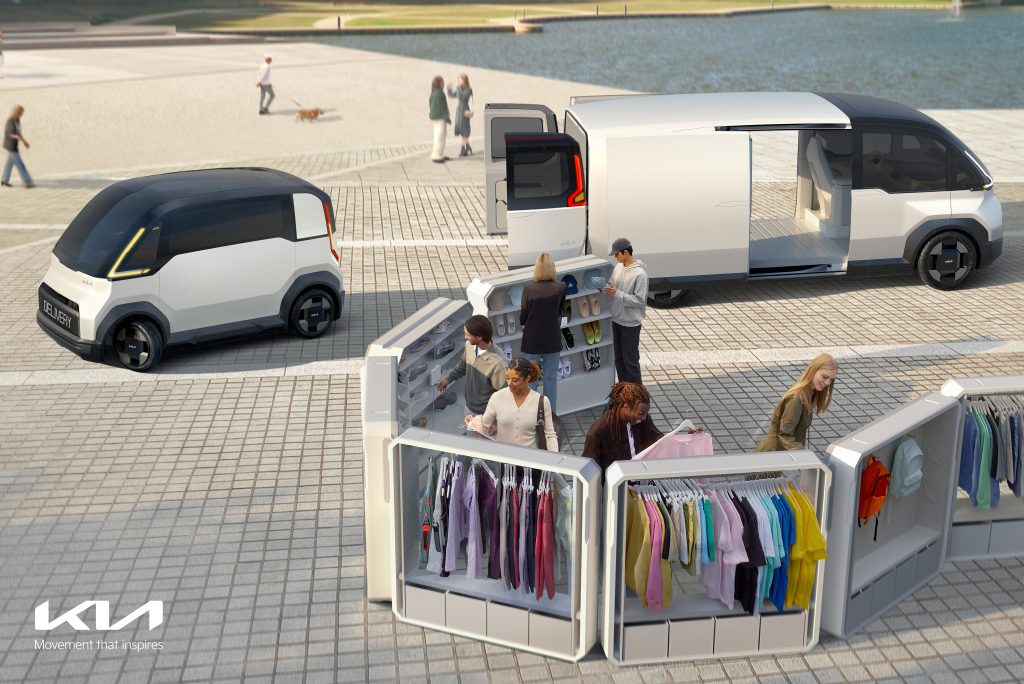Kia’s Visionary Leap into the Future with its “Platform Beyond Vehicle” Strategy
Radical modularity and architecturally-driven design are the basis for their look into the future and provide a viable path to get there
Courtesy of Kia
” data-medium-file=”https://carsnspeed.net/wp-content/uploads/2024/01/kias-visionary-leap-into-the-future-with-its-platform-beyond-vehicle-strategy-7.jpg” data-large-file=”https://carsnspeed.net/wp-content/uploads/2024/01/kias-visionary-leap-into-the-future-with-its-platform-beyond-vehicle-strategy.jpg”>
At CES 2024, Kia Motors presented a transformative vision for the future of transportation through its Platform Beyond Vehicle (PBV) strategy, which marks a significant shift in the company’s direction. This multi-phase plan, as outlined by Kia’s President and CEO, Ho Sung Song, is not merely an advancement in mobility technology but a complete reimagining of space and lifestyle possibilities. A look at the third phase of this plan—and its forecasted rollout in 2032—feels like science fiction, or a future that’s unattainable in eight short years. And yet, when viewing a map of all three passes, there’s a believable path forward.
Kia envisions PBVs evolving into “a highly customizable mobility solutions platform.” Karim Habib, Vice President of Design at Kia, described a vision where PBVs would integrate more deeply with future mobility ecosystems and city infrastructure. Vehicles will be managed as part of a single smart operating system. With advancements in autonomous driving, urban air mobility, robotics and energy storage, PBVs in phase three would help unlock “completely new lifestyles by creating a robust mobility ecosystem.” With this phase, Kia aims to reach a stage where mobility and daily life are seamlessly intertwined. PBVs will play a central role in how people live, work and interact within smart cities and communities.
Today Kia’s PBV concept is most vividly captured in the Kia Concept PV5, a symbol of PBV innovation. This modular vehicle is designed to transcend traditional transportation, offering versatile solutions that adapt from taxis to delivery vans to recreational spaces seamlessly. As Habib put it, the PBV strategy aims to create vehicles that are “unbounded by the traditional restrictions of space and time,” offering a “blank canvas to reimagine lifestyles.”
Courtesy of Kia
” data-medium-file=”https://carsnspeed.net/wp-content/uploads/2024/01/kias-visionary-leap-into-the-future-with-its-platform-beyond-vehicle-strategy-12.jpg” data-large-file=”https://carsnspeed.net/wp-content/uploads/2024/01/kias-visionary-leap-into-the-future-with-its-platform-beyond-vehicle-strategy-1.jpg” src=”https://carsnspeed.net/wp-content/uploads/2024/01/kias-visionary-leap-into-the-future-with-its-platform-beyond-vehicle-strategy-1.jpg” alt class=”wp-image-351588″ srcset=”https://carsnspeed.net/wp-content/uploads/2024/01/kias-visionary-leap-into-the-future-with-its-platform-beyond-vehicle-strategy-1.jpg 1024w, https://carsnspeed.net/wp-content/uploads/2024/01/kias-visionary-leap-into-the-future-with-its-platform-beyond-vehicle-strategy-12.jpg 300w, https://carsnspeed.net/wp-content/uploads/2024/01/kias-visionary-leap-into-the-future-with-its-platform-beyond-vehicle-strategy-13.jpg 768w, https://carsnspeed.net/wp-content/uploads/2024/01/kias-visionary-leap-into-the-future-with-its-platform-beyond-vehicle-strategy-14.jpg 1536w, https://carsnspeed.net/wp-content/uploads/2024/01/kias-visionary-leap-into-the-future-with-its-platform-beyond-vehicle-strategy-15.jpg 2048w, https://carsnspeed.net/wp-content/uploads/2024/01/kias-visionary-leap-into-the-future-with-its-platform-beyond-vehicle-strategy-16.jpg 600w” sizes=”(max-width: 1024px) 100vw, 1024px”>
Phase One of this journey introduces the PBV5, optimized for uses like hailing and delivery, featuring enhanced data connectivity for software-defined fleets. This phase represents the birth of versatile, multi-purpose electric vehicles (EVs). Phase Two evolves PBVs into AI-based mobility platforms, integrating artificial intelligence to interact with users and stay continually updated. This phase marks the beginning of new business forms linked with robotics and other future technologies. Phase Three transforms PBVs into highly customizable mobility solutions, integrating them into the future mobility ecosystem and smart city infrastructure.
Courtesy of Kia
” data-medium-file=”https://carsnspeed.net/wp-content/uploads/2024/01/kias-visionary-leap-into-the-future-with-its-platform-beyond-vehicle-strategy-17.jpg” data-large-file=”https://carsnspeed.net/wp-content/uploads/2024/01/kias-visionary-leap-into-the-future-with-its-platform-beyond-vehicle-strategy-2.jpg” src=”https://carsnspeed.net/wp-content/uploads/2024/01/kias-visionary-leap-into-the-future-with-its-platform-beyond-vehicle-strategy-2.jpg” alt class=”wp-image-351590″ srcset=”https://carsnspeed.net/wp-content/uploads/2024/01/kias-visionary-leap-into-the-future-with-its-platform-beyond-vehicle-strategy-2.jpg 1024w, https://carsnspeed.net/wp-content/uploads/2024/01/kias-visionary-leap-into-the-future-with-its-platform-beyond-vehicle-strategy-17.jpg 300w, https://carsnspeed.net/wp-content/uploads/2024/01/kias-visionary-leap-into-the-future-with-its-platform-beyond-vehicle-strategy-18.jpg 768w, https://carsnspeed.net/wp-content/uploads/2024/01/kias-visionary-leap-into-the-future-with-its-platform-beyond-vehicle-strategy-19.jpg 1536w, https://carsnspeed.net/wp-content/uploads/2024/01/kias-visionary-leap-into-the-future-with-its-platform-beyond-vehicle-strategy-20.jpg 2048w, https://carsnspeed.net/wp-content/uploads/2024/01/kias-visionary-leap-into-the-future-with-its-platform-beyond-vehicle-strategy-21.jpg 600w” sizes=”(max-width: 1024px) 100vw, 1024px”>
The design of Kia’s PBVs is pivotal, featuring a “Dynamic Hybrid” weldless body structure for adaptable vehicle purposes. Extensive use of sustainable materials like bio plastic and recycled PET fabric highlights Kia’s commitment to environmental responsibility. The interior designs offer innovative features, such as a cockpit that doubles as a desk, and steering wheels that transform into desk lamps, ensuring that the vehicles serve as mobile living and working spaces.
Courtesy of Kia
” data-medium-file=”https://carsnspeed.net/wp-content/uploads/2024/01/kias-visionary-leap-into-the-future-with-its-platform-beyond-vehicle-strategy-22.jpg” data-large-file=”https://carsnspeed.net/wp-content/uploads/2024/01/kias-visionary-leap-into-the-future-with-its-platform-beyond-vehicle-strategy-3.jpg” src=”https://carsnspeed.net/wp-content/uploads/2024/01/kias-visionary-leap-into-the-future-with-its-platform-beyond-vehicle-strategy-3.jpg” alt class=”wp-image-351596″ srcset=”https://carsnspeed.net/wp-content/uploads/2024/01/kias-visionary-leap-into-the-future-with-its-platform-beyond-vehicle-strategy-3.jpg 1024w, https://carsnspeed.net/wp-content/uploads/2024/01/kias-visionary-leap-into-the-future-with-its-platform-beyond-vehicle-strategy-22.jpg 300w, https://carsnspeed.net/wp-content/uploads/2024/01/kias-visionary-leap-into-the-future-with-its-platform-beyond-vehicle-strategy-23.jpg 768w, https://carsnspeed.net/wp-content/uploads/2024/01/kias-visionary-leap-into-the-future-with-its-platform-beyond-vehicle-strategy-24.jpg 1536w, https://carsnspeed.net/wp-content/uploads/2024/01/kias-visionary-leap-into-the-future-with-its-platform-beyond-vehicle-strategy-25.jpg 2048w, https://carsnspeed.net/wp-content/uploads/2024/01/kias-visionary-leap-into-the-future-with-its-platform-beyond-vehicle-strategy-26.jpg 600w” sizes=”(max-width: 1024px) 100vw, 1024px”>
Kia’s PBV ecosystem encompasses various vehicle models, including the PBV5, PV7 and PV1, designed to interact and connect, enhancing versatility and offering endless possibilities. This ecosystem also includes sophisticated In-Vehicle Infotainment, Fleet Management Systems and charging solutions, leveraging AI and data to offer customer-centric solutions and predictive maintenance.
Courtesy of Kia
” data-medium-file=”https://carsnspeed.net/wp-content/uploads/2024/01/kias-visionary-leap-into-the-future-with-its-platform-beyond-vehicle-strategy-27.jpg” data-large-file=”https://carsnspeed.net/wp-content/uploads/2024/01/kias-visionary-leap-into-the-future-with-its-platform-beyond-vehicle-strategy-4.jpg” src=”https://carsnspeed.net/wp-content/uploads/2024/01/kias-visionary-leap-into-the-future-with-its-platform-beyond-vehicle-strategy-4.jpg” alt class=”wp-image-351592″ srcset=”https://carsnspeed.net/wp-content/uploads/2024/01/kias-visionary-leap-into-the-future-with-its-platform-beyond-vehicle-strategy-4.jpg 1024w, https://carsnspeed.net/wp-content/uploads/2024/01/kias-visionary-leap-into-the-future-with-its-platform-beyond-vehicle-strategy-27.jpg 300w, https://carsnspeed.net/wp-content/uploads/2024/01/kias-visionary-leap-into-the-future-with-its-platform-beyond-vehicle-strategy-28.jpg 768w, https://carsnspeed.net/wp-content/uploads/2024/01/kias-visionary-leap-into-the-future-with-its-platform-beyond-vehicle-strategy-29.jpg 1536w, https://carsnspeed.net/wp-content/uploads/2024/01/kias-visionary-leap-into-the-future-with-its-platform-beyond-vehicle-strategy-30.jpg 2048w, https://carsnspeed.net/wp-content/uploads/2024/01/kias-visionary-leap-into-the-future-with-its-platform-beyond-vehicle-strategy-31.jpg 600w” sizes=”(max-width: 1024px) 100vw, 1024px”>
Underlining the importance of global collaboration, Kia has established partnerships with companies like Uber and Dubai Taxi Corporation. These alliances are integral in enhancing Kia’s dedicated PBV business system and extending its reach into diverse mobility domains, including robotics and Advanced Air Mobility.

As Kia embarks on this ambitious journey, it’s evident that the company’s vision transcends traditional mobility. The PBV strategy represents a roadmap toward a more sustainable, connected and versatile future, where transportation is seamlessly integrated into daily life. Pierre-Martin Bos, Vice President and BDM Director of Kia PBV Business Division, summarizes this vision: “The Kia PBV business is the pinnacle of our customer-centric approach, driving us toward becoming a sustainable mobility solutions provider.”

